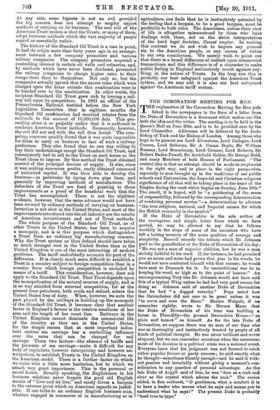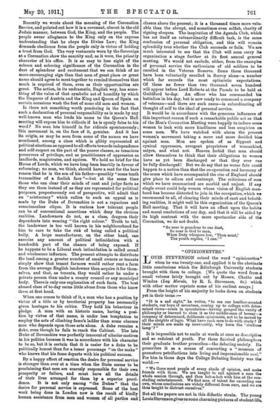THE CORONATION MEETING FOR MEN. T HE explanation of the Coronation
Meeting for Men pub- lished in the newspapers in the form of a letter from the Duke of Devonshire is a document which makes one like both the idea and the writer. The meeting is to be held in the Queen's Hall on June 20th, and is to be presided over by the Lord Chancellor. Addresses will be delivered by the Arch- bishop of York and the Bishop of London. Among those who hope to be present are Lord Alverstone, Lord Cadogan, Lord Curzon, Lord Selborne, Sir A. Conan Doyle, Sir William Ramsay, Lord Beauchamp, Lord Cromer, Lord Roberts, Sir Robert Baden-Powell, Sir Archibald Geikie, Sir George Reid, and many Members of both Houses of Parliament. " The central idea is that an attempt should be made to emphasize in the right way, and to place in the right perspective, especially to men brought up in the traditions of our public schools and Universities, the Imperial and Christian religions significance of all that will be taking place in the heart of the Empire during the week which begins on Sunday, June 18th." The result, it is hoped, will be " a quickening of the sense of responsibility, followed by the corresponding determination of rendering personal service "—a determination to advance "the true religious, national, and Imperial causes for which the British monarchy is the symbol."
If the Duke of Devonshire is the sole author of the courageous and simple letter from which we have quoted, we may be allowed to say that he follows worthily in the steps of some of his ancestors who have left a lasting memory of the same qualities of courage and simplicity. Boswell records the tribute which Dr. Johnson paid to the grandfather of the Duke of Devonshire of his day : "He was not a man of superior abilities, but he was a man strictly faithful to his word. If, for instance, he had promised you an acorn and none had grown that year in his woods, he would not have contented himself with that excuse ; he would have sent to Denmark for it. So unconditional was he in keeping his word, so high as to the point of honour." An uncompromising Tory like Dr. Johnson would not have said this of a typical Whig unless he had had very good reason for doing so. Johnson said of another Duke of Devonshire that he had " a dogged veracity." Pope noted how the Cavendishes did not care to be great unless it was "to serve and save the State." Horace Walpole, if we remember rightly, wrote to Sir Horace Mann that the Duke of Devonshire of his time was building a house in Piccadilly—the present Devonshire House—" as plain and honest" as himself. As for the late Dnke of Devonshire, we suppose there was no man of our time who was so thoroughly and instinctively trusted by people of all kinds of political thought. He was never brilliant and never eloquent, but we can remember occasions when the announce- ment of his decision in a political crisis was a national event. Everyone knew that his judgment was not formed to catch either popular favour or party success ; he said exactly what he thought—sometimes bluntly enough—and he said it with- out passion and invariably without giving a moment's con- sideration to any question of personal advantage. As the late Duke of Argyll said of him, he was " firm as a rock and clear as the crystal which adorns the rock." The orator added, in fine outburst, "O gentlemen, what a comfort it is to have a leader who means what he says and means you to understand what he says I" The present Duke is probably "bred true to type."
Recently we wrote about the meaning of the Coronation Service, and pointed out how it is a covenant, almost in the old Judaic manner, between God, the King, and the people. The people swear allegiance to the King only on the express understanding that he obeys the Divine Law; the King demands obedience from the people only in virtue of holding a trust from God. The very vestments worn by the Sovereign at a Coronation show the sanctity and, as it were, the priestly character of his office. It is so easy to lose sight of the solemn and sobering significance of the Coronation in the dust of splendour and excitement that we can think of no more encouraging sign than that men of great place or great name should agree to meet together to remind themselves that much is required of them, even as their opportunities are great. The action, in its undramatic, English way, has some- thing of the value of that symbolic act of humility by which the Emperor of Austria and the King and Queen of Spain on certain occasions wash the feet of some old men and women.
Is there not something worth pondering in the fact that such a declaration of personal responsibility as is made by any well-known man who lends his name to the Queen's Hall meeting will expose him to ridicule if he is openly false to his word ? No man lets himself in for ridicule spontaneously; this movement is, on the face of it, genuine. And it has its origin, as may be seen from some of the names we have mentioned, among a class which is glibly represented at political elections as opposed to all efforts towards independence and self-respect on the part of the poorer classes, as tenacious preservers of privilege, and as practitioners of oppression as landlords, magistrates, and squires. We hold no brief for the House of Lords, which we have long been heartily in favour of reforming; no man, we think, should have a seat for the bare reason that he is the son of his father—possibly "some tenth transmitter of a foolish face "—but at the same time those who can clear their minds of cant and judge facts as they see them instead of as they are represented for political purposes, preposterously out of perspective, will admit that an " aristocracy" which rallies to such an appeal as is made by the Duke of Devonshire is not a rapacious and conscienceless clique. It is curious how tolerant people can be of conventional assertions which deny the obvious realities. Landowners do not, as a class, dragoon their dependents into wearing "the right colour." Truth to tell, the landowner is too well known in his neighbourhood for him to care to take the risk of being called a political bully. A large manufacturer, on the other hand, can exercise any amount of political intimidation with a hundredth part of the chance of being exposed. If he happens to be a Liberal such intimidation is called sound and wholesome influence. The present attempts to distribute the land among a greater number of small owners or tenants simply show that tenant farmers would rather rent a farm from the average English landowner than acquire it for them- selves, and that, as tenants, they would rather be under a private person than under a county council or any municipal body. There is only one explanation of such facts. The best abused class of to-day earns little abuse from those who know them at first hand.
When one comes to think of it, a man who has a position by virtue of a title or by territorial property has necessarily given hostages to his critics. They hold his behaviour in pledge. A man with an historic name, having a posi- tion by virtue of that name, is under less temptation to employ the arts of climbing fame's ladder than some obscure man who depends upon those arts alone. A duke remains a duke, even though he fails to reach the Cabinet. The late Duke of Devonshire was perfectly innocent of ulterior motives in his politics because it was in accordance with his character to be so, but it is certain that it is easier for a duke to be politically honest than for a lesser personage " on the make " who knows that his fame departs with his political success.
By a happy effect of reaction the desire for personal service is stronger than ever at a time when the State seems to be proclaiming that men are scarcely responsible for their own prosperity or failure, and must have all the details of their lives arranged for them by a superior provi-
dence. It is not only among " the Dukes " that the desire for personal service is expressed. Some of the best work being done in London now is the result of kindly human assistance from men and women of all parties and
classes above the poorest; it is a thousand times more valu- able than the abrupt, and sometimes even selfish, charity of signing cheques. The inspiration of the Agenda Club, which has set itself an extraordinarily difficult task, is the same confession of personal obligation, and this will remain splendidly true whether the Club succeeds or fails. We are much interested to see that the Club will soon carry its organization a stage further at its first annual general meeting. We would not exclude, either, from the examples of personal service the enthusiasm of old soldiers to be enrolled in the Veteran Reserve. Some three thousand have been voluntarily enrolled in Surrey alone—a number which far exceeds the most optimistic expectations. Of these no fewer than two thousand seven hundred will appear before Lord Roberts at the Parade to be held at Guildford to-day. An officer who has commanded his battalion in his day, but is now ready to command a company of veterans—and there are such cases—is subordinating all thought of self to the ideal of personal service.
It would be in accordance with the generous influences of this important season if such a remarkable public act as that
of the Men's Coronation Meeting were happily to induce some women to look with more kindliness and less suspicion on some men. We have watched with alarm the present women's movement taking a more and more decided bias against men. Men are spoken of as flippant and cynical oppressors, arrogant proprietors of womankind, satyrs, and what not. Heaven forbid that men should allow themselves to think that their obligations to women have as yet been discharged or that they ever can be fully discharged! But we do say that no worse fate could happen to a nation than that the co-operation and harmony of the sexes which have accompanied the rise of England should give place to odium and contempt. The criticisms of men which we have summarized are morbid and unjust. If any
single event could help women whose vision of English man- hood has become distorted to join in the occupation, which we
recommend to all, of clearing their minds of cant and behold- ing realities, it might well be this organization of the Queen's Hall meeting. That it will have an effect upon the habits and moral resolutions of our day, and that it will be aided by its high contrast with the more spectacular side of the Coronation, we do not doubt.
" So near is grandeur to onr dust, So near is God to man,
When Duty whispers low, Thou must,' The youth replies, I can.' "









































 Previous page
Previous page